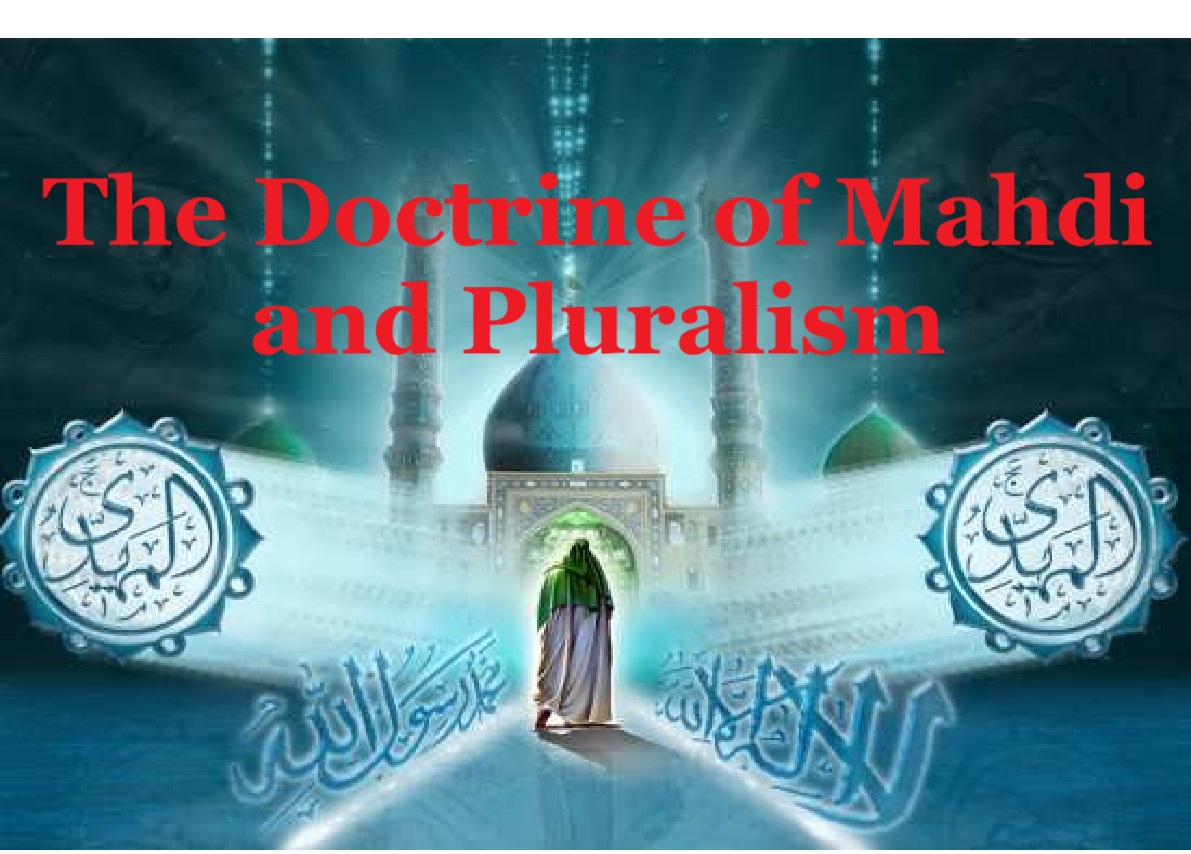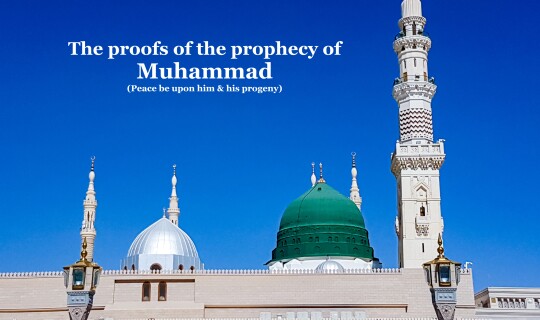Literally, pluralism means “many” and “multiple” and, technically, it refers to the difference in viewpoints and plurality of the readings of a school. The term pluralism is not only used in religion but it is also used in other disciplines such as ethics, law and politics. In this paper, we will try to examine briefly the idea of religious pluralism and its relation with the doctrine of al-Mahdi in Islam.
The history and origin of the idea of religious pluralism
Unacceptable conduct of the medieval church along with her failure in engaging with productive and respectful dialogue with the scientists and philosophers paved the way for development of religious pluralism. Of course, the foundation of this theory is deeply connected with political and religious liberalism as well. The term “liberalism” was used for the first time by a political ideology at the end of the nineteenth century in Europe.
The movement in theology founded by Friedrich Schleiermacher was identified as liberal Protestantism at the same time. However, there are those liberal protestants who are not politically liberal and also political liberals who are not concerned with religious liberalism. The mentality among political and religious liberals in ethical, social and political terms is more often than not the reflection of the same basic beliefs and perspectives especially in terms of the relationship between religion and politics.
Religious liberalism appeared along with political liberalism. In fact, it was a reaction against political liberalism. At first, political liberalism which was a reaction against wars and homicide emerged. A group of political thinkers revolted against prejudice and founded political liberalism based on tolerance, forbearance and respect for individual freedoms and rights. Afterwards, religious liberalism appeared to politically justify political liberalism. A group of Christian theologians, including Schleiermacher, defended this viewpoint theologically and philosophically.
Thus, the historical record of religious liberalism is traced back to the nineteenth century, starting with Schleiermacher and rooted in political liberalism. Therefore, some of the features of religious liberalism or liberal Protestantism resulted from the acceptance of modern and nontraditional interpretations of the Bible and recognition of religious experience and personal feeling as the basis and essence of religion.
Thus, Protestantism is the source of political liberalism which itself is the source of religious liberalism; therefore, religious pluralism is the result of religious liberalism.
Religious Pluralism
There are various interpretations of religious pluralism, the most important being:
1. The true religion is only one but this one absolute truth is not received by one divine prophet. It has been revealed to all prophets in one form or another. In other words, the religions of Islam, Christianity and Judaism represent different aspects of a single truth. The difference between the aspects is not that they are right or wrong; rather, they differ in point of view. Therefore, all divine religions are the same in legitimacy and each can lead to human happiness.
2. There are many and various truths. This interpretation recognizes all religions and human schools of thought, but considers the truth of one religion different from that of other religions. In other words, it does not believe in a single ‘Right Path’ but in multiple ‘Right Paths’. Thus, it regards all human religions and schools as genuine and parallel paths to human felicity and salvation.
As Christian theologian and philosopher John Hick argues, pluralism implies that it is possible to have “the conversion of human beings from egoistic to truth (of God)-oriented attitude in different ways within all world religious traditions. In other words, there are various and plural ways for happiness and salvation.”
Of course, the theory of religious pluralism stands against religious ‘exclusiveness’ which holds that there is only one true religion. Of course, exclusivism may leave some room for happiness of followers of some other religions. For example, from a Christian point of view, Christianity is the only true religion, but since followers of other religions have been looking for the divine will and submitted to it, they are actually harmonious with the spirit and message of Christianity, despite the fact that they have not known Christianity or knowingly repudiated it. Karl Rahner, an advocate of this theory, has called such people “the unknown Christians.”
The principle of salvation and felicity
Another interpretation of pluralism is to regard religion as a path to salvation and eternal happiness. In other words, all divine laws in all ages lead to salvation. Believing in God, following divine laws, and implementing their precepts are sufficient to reach salvation.
To understand this subject we must first be aware that the idea of religious pluralism in Christianity is the result of special Christian beliefs about salvation and felicity. This means that man can benefit from the sacrifice of Jesus Christ and find salvation solely through Christianity.
According to the traditional teachings of Christianity, salvation is available only through faith in Jesus Christ. Even the great prophets must wait in Limbo for Jesus Christ to take measures and bring them salvation. A group of Christian thinkers who opposed this idea tried to find a way for the salvation of non-Christians. They claimed that faith can lead to salvation.
Despite their religious affiliation, those who are faithful have potentially accepted Christianity. They proposed that there ought to be a faith of the common heritage for all the great religious traditions of the world. Regardless of the differences in view among Christian groups concerning pluralism, there is a common presupposition.
An appropriate faith is the prerequisite for salvation. This view is also supported by Hick and Rahner. To open the gate of paradise more, Rahner has extended the meaning of appropriate faith to include those who live like Christians and might have converted to Christianity had they been subject to Christian teachings. However, Hick has taken it a step further to emphasize the compatibility of the surface differences of world religions.4 The principle of salvation and felicity in Christianity is a response to the question of who would be worthy of it and who would be deprived of this privilege.
Christian scholars, including Hick, respond to this question in different ways: 1) exclusiveness, 2) inclusiveness, and 3) religious pluralism.
The exclusivists believe that truth and felicity exist in only one religion and there is only one inclination to one religion through which one may reach felicity. That is, through the belief in the death of Jesus as a sacrifice, forgiving people’s sins and participating in the sacrifice is the only factor of felicity.
The adherents of inclusiveness believe that although Christianity is the only way of salvation, all could step in this path provided that they adhere to the rules of the religion and sincerely follow it. Christians who are good doers and follow the teachings of Jesus Christ are also regarded as worthy of salvation. In proving this, several justifications are given.
For example, one justification is that other religions are not absolutely void and have somehow benefited from the truth and eternal happiness. However, there is only one main road; other roads are close to the main one and their followers are subject to salvation.
But religious pluralism states all religions can be a source of felicity and salvation. In other words, truth and felicity may be with all religions and all their followers might benefit it. All religions are different aspects of one truth; therefore, they are different ways to a single truth. Followers of other religions are not subject to punishment.
Therefore, religious pluralism, in response to the principle of salvation, went beyond and introduced the genuineness of non-Christian religions. The adherents of this attitude severely criticized the claim of the genuineness of a particular religion in order to open the gate of Heaven to followers of non-Christian religions. They believed that all religions are true and it guides their followers to the final truth. Thus, currently in the West the issue of religious pluralism is beyond the principle of felicity.
Therefore, it is essential to elaborate on the Islamic idea about the two issues of “the principle of salvation” and “the genuineness of all religions” and with a look into the religion, study the two issues under the one title of “Islam and the genuineness of religions.” Islamic sources will be used to elucidate the Islamic idea in this regard. Then the relationship between this issue and the doctrine of Mahdi will be analyzed.
Islam and the genuineness of religions
According to Islam, the issue of salvation and felicity is different from the genuineness. The concept of salvation and felicity in Islam is wider in its scope than the concept of genuineness. According to Islam, salvation and eternal happiness is possible for the following: followers of Islam since the time of the Prophet (S) until the end of the world, followers of every divine religion before a new religion came from God and those who essentially had no access to true religion, such as those who could not find out or understand it and those who have not yet reached puberty. The Holy Qur’an exempts such groups from obligations and, therefore, they are not subject to punishment.
It should be mentioned that every religion at every period was intended to save its followers. However, they did not work parallel to each other; otherwise, there would be no difference between Islam and other religions. The Qur’an invites Jews and Christians to Islam. It also criticizes those who refute the Qur’an and the Prophet of Islam.
Therefore, the belief that all religions are true or that each of them carries a part of the truth and thus is a source of salvation for its followers even at the present age is not acknowledged by Islam. Islam does not recognize all religions as true. It condemns the exclusive claim of the Jews and the Christians as mentioned in various verses in the Holy Qur'an:
“The Jews said that only the Jews would enter Paradise and the Christians said only the Christians. This is only a void wish of theirs; say to them bring evidence if you are truthful.”
Nevertheless, Islam is exclusive in terms of genuineness but its exclusiveness is different from that of Judaism and Christianity, because the exclusive attitude of Islam in terms of genuineness implies that after Muhammad (S) was called to prophethood, whoever received his message and could understand the content then he or she had to accept the invitation to Islam. The Holy Qur’an, in The Cattle: 19, quotes the Prophet of Islam:
“God is witness between me and you, and this Qur’an has been revealed to me that I may warn you thereby, and whomsoever it may reach”
Other divine laws such as that of Abraham, that of Moses and that of Jesus Christ have been valid at their own time. It should be noted that Islam is sometimes applied to all divine religions and laws so the religion that each messenger brought from God was Islam. It is also used to refer to the special religion and law of the Prophet Muhammad (S). The former is called “the eneral Islam” and the latter is called “the particular Islam.”
Therefore, the truth of all divine religions is one which is revealed to all prophets who possessed a law. What has been revealed to them is the assertion of God's Unity and submission to the Absolute One. Thus, it is erroneous to think that the truth of religions has been completely out of the reach of the prophets and that the religions have not been completely revealed to them.
Neither is it true that when there is a difference among the divine religions it is due to difference of opinion amongst the prophets and the variety of the aspects of the truth. However, the reason to such differences is the difference in mental growth of humanity as well as varying cultural and social conditions Additionally, the difference among the followers of early divine laws and the distortions they were subject to are among the other causes for renewing the divine laws.
The plurality which exists in religions and divine laws and sources is not relative but ambiguous, the ambiguity of external facts and the ambiguity of human sciences; because the divine laws, depending on the needs of people of different periods, are revealed as various facts in many laws, while common at the same time. Such is the case of prescribing different kinds of medicine for a patient at different stages.
A doctor prescribes a particular medicine at each stage. Each medicine in turn has its special effect. It is not the case that some medicine is useful and some other is useless. Therefore, the differences among the divine laws are related to ambiguity in external reality. The same exists in the human sciences since understanding is actually the result of different degrees of understanding of realities, knowledge becomes ambiguous and the differences of opinion among interpreters in interpreting a text are of the same kind.
According to the Holy Qur’an, all the monotheistic religions are actually one religion and all prophets invite people to Islam. We read in the Qur’an:
The same religion has He established for you as that which He enjoined on Noah - which We have sent by inspiration to thee - and that which We enjoined on Abraham, Moses, and Jesus: Namely, that ye should remain steadfast in religion, and make no divisions therein.
The truth of Islam in this sense is submitting wholeheartedly to the divine commands. Imam Ali (A) defines Islam in this way: “Islam is submission which is certitude which is acknowledgement which is admission which is fulfilment which is to act.”
Thus, the general Islam which is submission to what appears in the form of Abraham's law at the time of Abraham, Moses's law at the time of Moses, Jesus's law at the time of Jesus and it appears in the form of Muhammad's law at the age of the seal of the prophecy.
The meaning of Islam at the time of each of the above-mentioned prophets is that the prophet of the time and also earlier prophets should be obeyed. People should have faith in the prophet of the time as well as the prophets before him. Otherwise, he or she would not have obeyed the divine commands. At the present time when Muhammad's law is to be followed since it is the crystallization of the general Islam, every sane person should follow and respond to him when hearing his message.
Ibn ‘Arabi, the well-known mystic, also believes in the superiority of Islam over other religions. He insists on exclusiveness, too, since he regards earlier religions as stars compared to the sun of Islam. He explicitly speaks of the expiration of the previous laws. In other sources he describes Islam as “the soul of religions,” “the trueth of all truths” and “the greater and the clearer truth” where he is explicit in the idea of the superiority of Islam over other religions.
The superiority of Islam implies that the existence of a law as the true law in every period in human history is an undeniable fact. The true law at our time is Islam. The soul and essence of all divine laws is the same monotheism in terms of belief and action. The common basis of the invitation of all divine prophets has been monotheism i.e. worship of the absolute One and submission to His will.
Some of the commands and prohibitions are common among religions while others are related to cultural and social conditions that change over time. Therefore, the religions contain common as well as individual points but with the advent of Islam as the most complete form of divine revelation and laws, all previous laws are no longer feasible.
The Holy Qur’an is the only one not distorted, since God has promised to guard it from corruption. As a matter of fact, this book is not limited to a particular time and place; on the contrary, it should be followed until the Day of Resurrection and throughout the world. With the advent of Islam, the divine religion has reached a state of perfection. Thus that would be the last prophet appointed by God.
Therefore, the principle of exclusiveness from the perspective of genuineness has a particular interpretation in Islam: it is the submission before the commands of the Almighty God. The fact that some of the “People of the Book” have been severely criticized in the Holy Qur’an is because they insisted on their way and path and did not submit to the command of God, despite the fact that they possessed certitude about God's commands and their responsibility towards them.
Although they knew that the Prophet's sayings are true and knew him as well as they knew their own children and could find in him the signs given by the Old and New Testament, they did not submit to the truth; on the contrary, they tried to hide it. However, the Holy Qur’an and the law of Muhammad were meant to guide the People of the Book too. It is only through this new revelation that they could find guidance into the straight path. In this regard, the Holy Qur’an explicitly states:
O People of the Book! Certainly Our Apostle has come to you, clarifying for you much of what you used to hide of the Book, and excusing many [an offense of yours]. Certainly there has come to you a light from God, and a manifest Book. With it God guides those who follow [the course of] His pleasure to the ways of peace, and brings them out from darkness into light by His will, and guides them to a straight path. (5:15 & 16)
Doctrine of Mahdi and belief in genuineness and eternality of Islam
As mentioned earlier, "religion" is one essence in all periods and is not described as plural. In other words, religion is beyond expiration and is not subject to addition or deduction. Since it is one, in Arabic dīn (religion) is used only in the singular form and not plural (adyān). Religion does not admit plurality and its truth is the admission to the one God who is worthy of worship. Thus the Holy Qur’an states:
The Religion before Allah is Islam (submission to His Will). (3:19)
Islam is the only acceptable religion:
If anyone desires a religion other than Islam (submission to Allah), never will it be accepted of him; and in the Hereafter He will be in the ranks of those who have lost (All spiritual good). (3:85)
Of course, this divine command is not restricted to the time of the Prophet; it is in effect in other ages as well. We read in the Holy Qur’an about the Prophet Abraham:
“Abraham was neither a Jew nor a Christian but he had submitted to the religion of Islam; he had not committed polytheism.” (3:67)
The meaning of this verse is nothing but the belief in plurality and variety of divine laws or religions since religion is the belief in the oneness of God and the unquestionable submission to Him which is the common aspect of all religions advertised and promoted by all prophets.
Therefore, the mission of Imam Mahdi (A) is nothing but the promotion of Islam, the one religion promoted by all divine prophets and its developed and comprehensive form under the title of "religion of Islam" as a perfect set of teachings and beliefs. Among the heavenly laws, Islam is not revealed for a particular time or place but it would include all nations and all periods:
We did not send you except as a bearer of good news and warner to all mankind, but most people do not know. (34:28)
We did not send you but as a mercy to all the nations. (21:107)
Islam came when human beings had reached a level of understanding that could receive and protect the final message of God. Thus, the religion of Islam is not limited to a particular age, group or race. It belongs to human nature and all human beings may draw on its guidance.
According to Shi‘ite and Sunni traditions, Imam Mahdi (A) will command on the basis of the Qur’an while his religion will be the religion of Islam and will take measures towards establishing justice and equity all over the world. He will surmount all obstacles on the way of this great mission and bravely introduce the original teachings of Islam. He will eliminate the divisions and will unite all human communities on the basis of the great religion of Islam. Imam Riḍā (A) praying to God said: “Oh God! Through him (Imam Mahdi) turn the Ummah's dispersion to continuity and division to unity; annihilate oppression and establish justice.”
Therefore, the plan of the promised Mahdi (A) for the world is to implement divine rules; he will call people to no religion but Islam. Logically, it goes without saying that it is not possible in any other way since the essence of religion is the same for all nations and races for the following reasons: firstly, no religion except Islam will be accepted by God; secondly, the truth of man who is created by God is an unchangeable one; thirdly, God is responsible for the development of this truth; fourthly, God will never be subject to ignorance, negligence and mistake but He is eternally aware of all truths.
Therefore, God does not have two religions and does not issue two sets of commands at the same time. This fact is mentioned in the Holy Qur’an. It is the manifestations of religion that are perfected. It is not true to say that religion had been defective and then it was perfected. In other words, the truth of religion is one; sometimes its lower stages are revealed; other times its final stages is revealed:
“This day have I perfected your religion for you, completed My favour upon you, and have chosen for you Islam as the best religion” (5:3)
The conditions of an era change only the subsidiary rules of religion, and not the principles of religion.
On the other hand, one might say since human being is a combination of soul and body, his soul depends on the metaphysical world which is stable throughout the ages and not affected by the passage of time. Thus, the causes and elements of its development should be looked for in metaphysics.
However, his body is rooted in nature and place and therefore his material needs may change. Therefore, the laws which are related to the changing dimension of man are themselves diverse and changing. The principles of religion and the general guidelines of ethics, laws and jurisprudence, prescribed for the unchageable of human beings are fixed themselves because man is of a stable nature. But the laws which depend on the conditions and ways of human life are varying.
The renaissance of Islam and its inclusiveness
The Shi‘a believe that Islam will be revived with the appearance of Imam Mahdi (A). He will also revive the Sunnah and conduct of the Prophet Muhammad (S). There are several verses in the Qur’an related to the advent of Imam Mahdi (A). For example, the Qur’an says:
It is He who has sent His Apostle with the guidance and the religion of truth, that He may make it prevail over all religions, though the polytheists should be averse. (9:33)
To illustrate this, here are some traditions interpreting the above-mentioned verse. For example, Abu Basir, a companion of Imam Sadiq (A) says that he asked the Imam about this verse and Imam replied: “I swear by God that the interpretation of the verse has not been realized yet”. I asked: “when will it be realized, my master?” Imam replied: “When the will of God is fulfilled and Imam Mahdi (A) appears. When he appears, the infidels will be worried about his appearance….” It is also narrated that Imam Baqir (A):
The Imam will be victorious because of the fear in the hearts of the enemy. He is supported by God; the earth will be trodden for him; the treasures of earth will be uncovered to him; while his sovereignty will cover the East and the West of the world. God will make His religion overcome all schools of the world though the infidels will be unhappy and opposing. He will rebuild the ruins of the earth while Jesus Christ will stand behind him for prayer.
It has been narrated from Imam Sadiq (A) who stated:
My father (Imam Baqir) was asked about the verse and he responded in this way: the verse is not to be interpreted yet; when Imam Mahdi (A) uprises those who are alive then will realize the interpretation of the verse. Then the religion of Muhammad will change as if from night to a true day. There will be no trace of polytheism then as stated by God in the verse.
Here, it is likely to mention a few points about the Shi‘ite belief in the sovereignty of Islam throughout the world by the last Imam, the realization of the divine ideals and a world government founded on justice, peace, coexistence of all human races and nations together with kindness in the light of the Holy Qur’an. Imam Mahdi, the only a son of the Prophet of Islam will materialize the promise of God.
According to Islamic hadiths, the successors of the Prophet Muhammad (S) are twelve in number and all descend from the Quraysh tribe.
This can be found in major Sunni collections of hadith like Sahih of Muslim, Sunan of Tirmidhi, Sunan of Abi Davoud and Musnad of Ahmad. The same can be found in major Shi‘a collections of hadith like Al-kāfi. In an authentic hadith, Kulayni reports that Imam Baqir (A) said: “God has sent the Prophet Muhammad (S) for the human being and the jinn and assigned twelve Imams.”
In the same book there is antother hadith from Imam Baqir (A) stating: “We are twelve Imams including Hasan and Husayn and then Imams who descend from Imam Husayn (A)”.
Again according to Sunni and Shi‘ite sources, the Imams descend from the family of Muhammad, the first one being Imam Ali (AS). For instance, Ibn Abbas narrates from the Messenger of God who has said:
Whoever likes to lead a life like mine, have a death like mine and find his destination in the paradise they should follow Ali (A), be a company of Imam Ali's followers and follow the Imams after me who descend from my household.
The Prophet said: “Mahdi (A) is a member of our household; the same behind whom Jesus Christ, son of Mary, stands for prayer.” The Prophet (S) also said: “Mahdi is a descendent of my household and a son of Fatima; he will struggle on the basis of my way and method as my struggle was based on revelation.” In another tradition the Prophet said: “He will uprise with the religion of Islam at the end of the world, as I moved with Islam at the beginning of Islam”.
It is clear then, according to these traditions, Imam Mahdi (AS) is a descendant of the prophet of Islam, that there will be a government of Islam at the end of the world and that there will be no other religion whatsoever. It can be understood from hadiths that the government of the Ahl al-Bayt will be the last government to implement justice and righteousness in the world.
Imam Mahdi (A) will attempt to form a united Islamic ummah of the world and establish justice, peace and permanent coexistence among all nations and groups of any race, colour and culture. In this regard, Imam Sadiq states: “God will elevate Islam after its trivialization through Imam Mahdi (A) and He will revive it after a period of isolation.”
In the supplications about Imam Mahdi (A), we find that God is asked to hasten the appearance of Imam Mahdi (A) and thus the fulfilment of the divine promise so that in the light of such a government Islam and Muslims find again their greatness and elevation while the infidels and the hypocrites meet humiliation and trivialization. For instance, we find in the prayer of “Iftitāh”:
Oh God! We ask you earnestly to establish an honourable government by which you honour Islam and Muslims and humiliate hypocrisy and the hypocrites; in that government make us of those who call for your obedience and guide into your path; blessed with such a government grant us gifts of grace in this world and in the hereafter.
According to the hadith of “Thaqalayn”, the infallible Imams, especially Imam Mahdi (A), will never get separated from the Holy Qur’an. Thus, he will put an end to the isolation of the Holy Qur’an. This tradition is widely transmitted and has been registered in the famous Sunni and Shiite resources. Twenty three companions of the Prophet have narrated it directly from the Prophet. Therefore, there cannot be any doubt about the authenticity of the tradition.
The infallible Imams are the true interpreters of revelation; they say nothing that contradicts the Holy Qur’an. Imam Ali (A) asserts:
He (Mahdi) takes the opinion from the Qur’an when others impose their own ideas on it; he shows them the way of justice and revives the Book and the Sunnah which have been isolated and abandoned.
Thus, since Imam Mahdi (A), like his forefathers, is the true interpreter of the Holy Qur’an and familiar with the secrets of the revelation and has access to the secret and the truth of the Qur’an, he will identify the inauthentic interpretations narrated after the demise of the Holy Prophet up until the age of appearance. He will clarify the true meaning of the Qur’anic verses to the people. He will also struggle to implement the Holy Qur’an on earth accompanied by Jesus Christ, son of Mary.
Thus, there will be a renaissance and a revival of the bright commands of Islam.
Conclusion
Reason dictates that we choose the more complete religion and prefer the more comprehensive and better divine law. Islam is the manifestation and the summary of the evolutionary development of past divine laws revealed to the great divine prophets by God at different ages and according to the conditions and intellectual and cultural capabilities of human communities.
There exists ample evidence in the Holy Qur’an and the hadiths which imply that at the end, the righteous people will rule throughout the world. Any kind of polytheism will be eliminated from the entire world. Such a universal event will be realized by a descendent of the prophet of Islam.
Thus, the doctrine of Mahdi and the belief in a one-world government is outstanding evidence which alludes to the fact that pluralism is baseless. It is because all will be called to one single religion. A single religion will govern the entire world. Jesus Christ, the son of Mary, will accompany and followthe Imam (A) and will invite his followers to accompany him (A) in this significant divine event.
These are good enough reasons that religion is limited to “the religion of Islam” and thus the idea of religious pluralism is rejected. Therefore, Imam Mahdi (A) will lead humanity towards a just law, permanent peace and justice as well as ethical and spiritual virtues.











